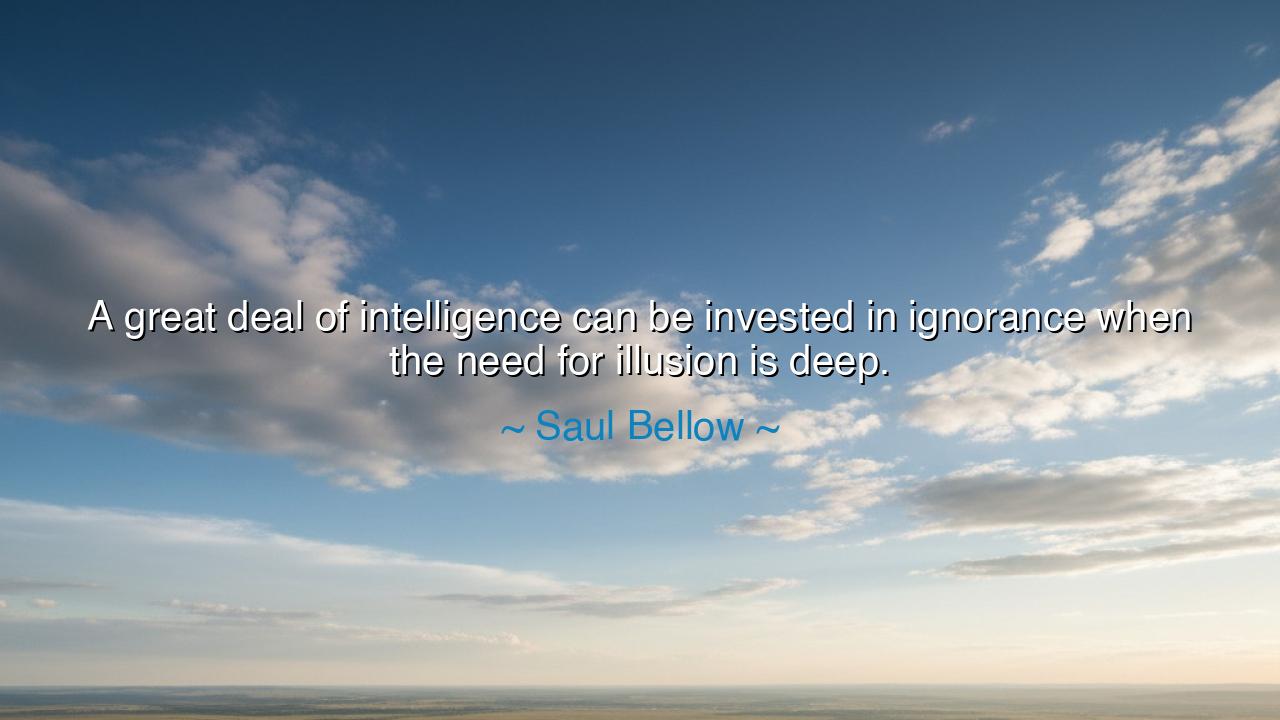
A great deal of intelligence can be invested in ignorance when
A great deal of intelligence can be invested in ignorance when the need for illusion is deep.






In the words of Saul Bellow, “A great deal of intelligence can be invested in ignorance when the need for illusion is deep.” This saying is as sharp as a blade and as sorrowful as truth itself. It unveils a paradox that has followed humanity since the dawn of thought — that the mind, that noble instrument of reason, can also become the servant of deception. Bellow, the keen observer of the modern soul, speaks here not of simple ignorance, but of chosen ignorance — the willful blindness that arises when truth becomes too heavy to bear. For when the heart thirsts for comfort more than clarity, even the most brilliant intellect will build walls of illusion and call them wisdom.
The origin of this quote flows from Bellow’s reflections on human nature in the mid-twentieth century — an age swollen with knowledge yet haunted by self-deception. As a novelist and philosopher of the spirit, he saw how modern man, armed with reason and education, could still deceive himself more thoroughly than any fool. It was not stupidity that troubled Bellow, but intelligent denial — the kind that cloaks itself in logic, science, or politics to justify its fears. In his eyes, the tragedy of the human being was not ignorance alone, but the brilliance with which we defend our illusions. We build philosophies, institutions, even nations, around comforting lies, and we do so with cleverness worthy of the gods.
This truth is not new. The ancients knew it well. Plato’s allegory of the cave tells of men chained in darkness, mistaking shadows for reality. When one of them escapes and sees the light, he returns to tell the others, but they resist him, for the light blinds their eyes and threatens their peace. This is the same truth Bellow speaks of — that many prefer the shadow that soothes over the sun that burns. And when the illusion is deep enough — when it feeds identity, faith, or pride — even the wisest minds will bend themselves into knots to preserve it. They will call falsehood truth and call fear reason, not out of ignorance, but out of need.
Consider the story of Galileo Galilei, who revealed that the Earth moves around the Sun, and not the other way around. The world, fearful of losing its sacred order, condemned him. But his enemies were not fools — they were learned men, priests, and scholars. Their intelligence was real, yet their need for illusion was deeper. The thought of an uncentered universe — one not revolving around mankind — was unbearable. And so, they invested their intellect in denial, twisting arguments to preserve a cosmos where humanity remained the heart of creation. This is the heart of Bellow’s warning: that intelligence without humility becomes the craft of delusion.
What Bellow reveals is a mirror to every soul. For who among us has not, at times, deceived ourselves? We craft excuses for our failures, justifications for our desires, reasons to avoid what we fear. And the more intelligent we are, the more sophisticated our self-deceptions become. The clever mind builds intricate arguments to defend the fragile heart. We tell ourselves stories — that we are right, that we are blameless, that the world is as we wish it to be — and we believe them because we must. Thus, the greatest lies are not told by fools, but by those too wise to face their own truth.
Yet Bellow’s words, though stern, are not without hope. To see this truth is the beginning of awakening. The way to break illusion is not through contempt, but through courage — the courage to see what is, even when it wounds. The soul that can look upon its own ignorance without fear begins the journey toward wisdom. For truth, though painful, is purifying; it burns away illusion like the morning sun dispels mist. The wise do not flee from the light — they learn to dwell in it, even when it blinds. To live truthfully is to accept that comfort and clarity rarely dwell in the same house.
Let this, then, be the lesson: do not use your intelligence to build walls around your heart. Use it instead to open doors within yourself. Question what you most wish to believe, for there, in your deepest certainties, the roots of illusion grow thickest. Remember that the mind is a powerful servant but a treacherous master. The greatest wisdom is not in knowing much, but in knowing what you do not know. Humility is the key to truth, and truth — though sharp, though lonely — is the only foundation upon which a noble life may stand.
So, my children of thought, beware of the seduction of comfort. For intelligence married to illusion creates empires of falsehood, while truth, though it walks alone, stands eternal. Seek clarity, not victory. Choose understanding over ease. And when the light of truth burns too brightly, do not turn away — let it burn, and let it cleanse. For only then will your intelligence become wisdom, and your wisdom become peace.






AAdministratorAdministrator
Welcome, honored guests. Please leave a comment, we will respond soon